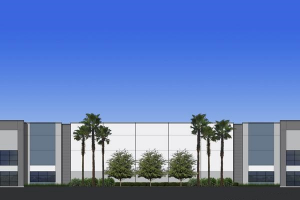With the trifecta of idling engines, diesel exhaust and the constant presence of 18-wheelers, industrial outdoor storage operators fight an uphill battle getting their projects approved by municipalities.
But rising demand — and the rising prices that come with it — has motivated developers to find ways forward despite community backlash.
Entitlement challenges, zoning difficulties and pushback from NIMBY-esque neighbors slow the production of IOS properties, causing developers to create strategies targeted at avoiding these pitfalls to get their deals done and meet a ballooning market need.
“The lack of available supply for truck terminals has historically been driven by local zoning ordinances,” said Cresa broker Eric Rose, who is based in Omaha, Nebraska. “Most communities aren’t friendly and won’t really add any more of these locations unless it’s via a case-by-case, special-use approval process, which is time-consuming and costly.”
As the continued growth of e-commerce and a renewed domestic manufacturing sector add pressure to expand trucking to handle increased logistics demand, some developers are striking out and figuring out how to add new capacity. With IOS vacancy rates slipping to 3% in 2022, according to Marcus & Millichap research, the need is clear. And with the high rents and sales prices being fetched by existing IOS properties, ground-up development can offer a significant payday, especially from interested institutional investors or truck carriers.
Earlier this month, Industrial Outdoor Ventures announced plans to turn the Twin Lakes Travel Park in Davie, Florida, 24 miles north of Miami, into a 38-acre industrial service facility. Situated south of Interstate 595, between State Road 7 and Florida’s Turnpike, the ground-up development will include two buildings totaling 227K SF and outdoor storage yards that can hold 280 truck trailers.
“This is another great opportunity for IOV to meet market demand by developing the type of modern facilities that today’s end users require and in a location that has a scarcity of land available for this type of asset,” Industrial Outdoor Ventures Senior Vice President of Development and Acquisitions Eric Johnson said in a statement.
Turnbridge Equities also just picked up a 3.6-acre site in Rancho Dominguez, California, near Los Angeles, in a $25.5M buy.
“The deal, another 2.49-acre pickup in the South Bay, aligns perfectly with our strategic vision of expanding our Industrial Outdoor Storage strategy in port-adjacent, infill and high barrier-to-entry markets,” a Turnbridge executive said in a statement.
In nearby Perris, California, Alterra IOS spent $8.5M on a 7-acre towing yard in early May, with plans to renovate it and reintroduce it as an IOS property with easy access to the busy Inland Empire.
Chicago-based Dayton Street Partners has been busy with redevelopments and plans to create new trucking facilities, one of just a handful of ground-up IOS developments taking place. The firm just finished a 95-acre terminal with 500K SF of industrial space at 5800 Mesa Road in Houston, which is being leased to the carrier Maersk.
The firm also has a 47-acre, 1,000-trailer terminal set to open in Baytown, Texas, near Houston and less than 20 miles from two Gulf ports, set to open in June. The terminal includes a 24-foot-tall, 1,382-foot-long building meant for unloading and reloading truck cargo. In addition, Dayton Street acquired two truck maintenance facilities in Atlanta with plans to renovate and reopen.
“The difficulties of finding appropriate space and building new facilities — often renovating existing industrial or vehicle-focused real estate, such as mobile home parks or underutilized warehouse sites with vacant buildings and minimal need for rehabilitation — means it often isn’t worth it to seek out real estate on the fringes of a market,” Dayton Street principal Howard Wedren said. “Financing has been rocky lately so it is difficult to get access to capital compared to those with longstanding client relationships.”
It is key to find locations near big travel hubs and ports, spots already in high demand for industrial developers seeking storage space.
“We don’t go to the outskirts,” Wedren said. “We’re very much into the high-barrier-to-entry sites. That’s our model, and we don’t deviate.”
High barriers are common for IOS projects. In Long Beach, California, the firm Cargomatic received city council approval for an IOS storage site last month near the busy Pacific port, just overcoming significant backlash by business groups and local leaders concerned about additional pollution from heavy trucks.
“There are no guarantees at the end of the day,” Cresa’s Rose said. “So do you go through a multiyear development process, not 100% certain that you’re going to get those rezoning and entitlements you need? Or do you just bite the bullet and buy the existing facility, and you can activate your service immediately upon opening the facility?”
In the case of Industrial Outdoor Ventures’ project in Davie, Director of Construction and Properties Rob Chase said the firm had good relationships with local leaders. It helped that the older travel park was showing signs of age and wear, and many in town were happy to replace the site with something newer.
Even with the support, it is a long process. Properly and fairly relocating existing residents is time-consuming, and even with the relatively simple construction requirements of these kinds of projects, it will still take 14 months of site work and construction once the site is cleared.
On the flip side, an empty site in Jurupa Valley, California, near the Inland Empire, that Industrial Outdoor Ventures acquired on the precipice of gaining approvals for construction in a portfolio purchase, now has to restart the entitlement process.
Chase said he sees the value of existing and new IOS facilities continuing to rise, spurring more developers to attempt more conversions, but he acknowledged that the process is often difficult.
“Having the right zoning is absolutely critical,” Chase said. “An entitlement process I describe as being long and drawn out is nothing in comparison to trying to change the zoning. That’s even more of a hill to climb. You could easily flip these properties, but pushing, sticking with it through to the finish line, is worth it.”
Source: Bisnow




